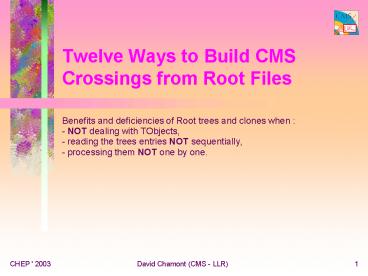Twelve Ways to Build CMS Crossings from Root Files - PowerPoint PPT Presentation
1 / 15
Title:
Twelve Ways to Build CMS Crossings from Root Files
Description:
CHEP ' 2003. David Chamont (CMS - LLR) 1. Twelve Ways to Build CMS Crossings ... Keys. ObjArray. Stl. File size (Kb/event) Cpu time (s/crossing) CHEP ' 2003 ... – PowerPoint PPT presentation
Number of Views:26
Avg rating:3.0/5.0
Title: Twelve Ways to Build CMS Crossings from Root Files
1
Twelve Ways to Build CMS Crossings from Root Files
- Benefits and deficiencies of Root trees and
clones when - NOT dealing with TObjects,-
reading the trees entries NOT sequentially,-
processing them NOT one by one.
2
Outline
- Goal scope.
- Main use-case.
- 4 kinds of containers for the crossing data
model. - 3 kinds of persistency managers.
- Results.
- Conclusions.
3
Goal Scope
- Evaluate the benefits of TTree and TClonesArray
for the persistency of CMS event data (whose
classes heavily rely on templates and external
packages). - Focus on the generation of crossings (pile-up of
about 160 simulated events chosen pseudo
randomly). - Not covered yet meta-data, associations between
persistent objects, schema evolution .
4
Main Use-Case
Digitizer
signal event (hits)
minbias event (hits)
digis
Persistency Manager
Persistency Manager
Persistency Manager
minbias events file
digis file
signal events file
minbias events file
5
Crossing Data Model
- The folders //root/crossing/ represent the
events composing the current crossing. - Each event folder contains a container for each
kind of event objects TrackHit, CaloHit, - The kind of container is chosen among four
- stdvectorltgt (by value).
- dynamic C array (each event object is wrapped
inside a class instrumented with classdef). - TObjArray (each event object is wrapped inside a
class derived from TObject). - TClonesArray (each event object is wrapped inside
a class derived from TObject).
6
Persistency Managers
- The task of a persistency manager is to transfer
an event from memory (TFolder) to disk (TFile)
and vice-versa. - Three flavors have been implemented
- RtbPomKeys directly write the TFolder in the
TFile, each time with a different meaningful
name. - RtbPomTreeMatrix for each container in the
folder, creates a TMatrixD and attach it to a
branch of a TTree. - RtbPomTreeDirect attach directly each container
to a branch of a TTree.
7
Implementation issues
- Recent progress
- can now use -ansi -pedantic.
- nice support of foreign classes.
- better and better support of templates and std
containers. - Recurrent problems with Root I/O
- must explicitly ask to parse namespaces,
components types and template instances. - multiple containers sizes and misleading
operator, - tuning of chain branchs,
- it is unclear which subset of C is supported by
Root I/O, and which in TTree, and which in
TClonesArray.
8
Configuration
- Pentium 4, 1.8 GHz.
- 512 Mo of RAM.
- IDE disk.
- RedHat Linux 7.3
- Gcc 3.2
- Root 3.05/03
9
Parameters of the Testbed
- compression level.
- size of buffers.
- split level.
- randomness burst and jump.
- size of the containers within the events.
- number of crossings.
- direct inheritance or not from TObject, direct
instrumentation or not with ClassDef. - resetting or not the values in the empty
constructors.
10
Best Results
File size (Kb/event)Cpu time (s/crossing) Stl C ObjArray Clones
Keys 1523.16 1754.82 1559.65 1554.43
Matrix 1492.44 1492.85 1493.15 1492.72
Tree 1532.63 1764.05 1567.27 541.87
11
Remove compression
File size (Kb/event)Cpu time (s/crossing) Stl C ObjArray Clones
Keys 3411.76 5683.00 4278.27 3842.95
Matrix 4001.01 400 1.45 400 1.71 400 1.23
Tree 3431.53 5702.70 4296.17 2141.16
12
Then increase random
File size (Kb/event)Cpu time (s/crossing) Stl C ObjArray Clones
Keys 3412.20 5683.42 4278.63 3843.40
Matrix 4001.31 400 1.78 400 2.03 400 1.59
Tree 3432.45 5703.71 4296.98 2142.71
13
Then reduce containers /10
File size (Kb/event)Cpu time (s/crossing) Stl C ObjArray Clones
Keys 34.90.82 54.20.96 43.61.51 39.51.05
Matrix 40.60.48 40.60.51 40.60.59 40.60.52
Tree 35.41.09 55.01.40 44.21.59 22.71.36
14
Then remove random
File size (Kb/event)Cpu time (s/crossing) Stl C ObjArray Clones
Keys 34.90.32 54.20.44 43.60.95 39.50.52
Matrix 40.60.15 40.60.18 40.60.24 40.60.18
Tree 35.40.22 55.00.32 44.20.66 22.70.14
15
Other Results
- Resetting the attributes to 0 in the empty
constructors of the event data does not help
compression. - Write cpu time of the different strategies
compares rather similarly than the read time,
with the Tree strategies a little slower.
16
Conclusions
- We succeeded to read pseudo-random entries from a
chain and dispatch them to few hundred folders
(despite tuning of TChain branches has not been
straightforward). - Support for foreign classes, templates and C
standard library has greatly improved. - The magic couple TTree/TClonesArray has proved
very efficient, yet it requires top level
TObjects and the benefits can become losses with
less data or random access pattern. - One can simply use std vectors and store them
directly into root files. Their integration in a
TTree is not as worth as a TClonesArray. This
could change in the next release of ROOT. - It would be interesting to retry with direct
associations between objects, and to apply the
testbed to POOL.














![[Fixed] Recover Deleted Text Messages Android without Root PowerPoint PPT Presentation](https://s3.amazonaws.com/images.powershow.com/9240286.th0.jpg?_=20190322055)







![How to Perform Android Data Recovery without Root? [3 Easy Ways] PowerPoint PPT Presentation](https://s3.amazonaws.com/images.powershow.com/9424657.th0.jpg?_=20200410069)








